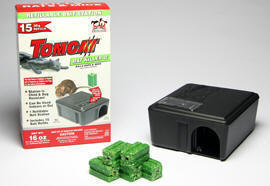Ducky Hero of the Month!
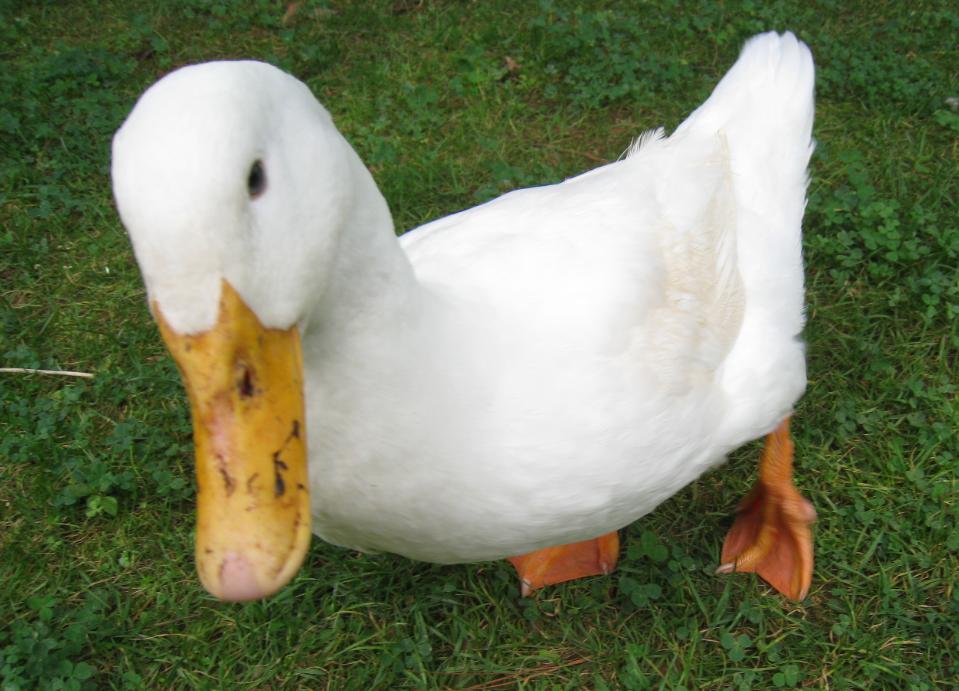
We LOVE hearing rescue stories and this month our hearts go out to Sweetie! Sweetie was abandoned on a pond in a city park and was discovered by a husband and wife during their jogging routine in January of 2012. Sweetie could be seen and heard swimming around and honking loudly, as if calling for her previous owners. Worried that she might not be eating well, they began feeding her and over time she began swimming over to the friendly joggers for a meal and plenty of attention.
And then in May... disaster struck and she went missing. The family searched everywhere and finally found her under a tree with an injured leg. They quickly scooped her up and brought her to a vet and then home and from that moment on Sweetie became a part of their family.
Thank you, Sweetie, for winning over these humans who were just jogging by one day and welcoming them into your heart! And special thanks to Sweetie's new Momma & Poppa who have taken her into their lives and home and given her back the love she thought she once lost forever.
Calcium Gluconate for Soft Eggs
Mercy is our resident soft egg layer. We recently decided to have blood work done to check her calcium levels and ionized calcium levels. The test confirmed her calcium was on the lowest end of normal, so our vet gave her an injection of diluted Calcium Gloconate.
It is vital to have blood work done before giving your duck (or goose... although soft eggs are very rare in geese) calcium supplements because low calcium levels may not be the issue at all. Genetic disposition, diet, cancer or other reproductive issues (metritis, salpingitis) may be at hand.
Too much calcium can lead to organ damage and result in renal or heart disease, compounding your duck's issues.
Vets seem to disagree as to whether the injection or the oral supplement is best. Our vet prefers the injection because some oral supplements can irritate the throat.
Injections are given once a month under vet guidance. Follow-up blood work may be required to monitor calcium levels.
How much does treatment cost? Blood work to determine ionized calcium levels can run around $120.00 (plus office exam) and injections cost about $25.00 each.
Mercy will be receiving her second injection in early August. We will keep you posted regarding her results.
September 2013 Update: In Mercy's case the Calcium Gluconate injections did not have an effect on her soft egg laying, so it was discontinued.
Domestic Duck Average Life Spans
When we first began this endeavor vet conversations, reading and chatting with friends all seemed to indicate that domestic ducks could live anywhere from 10-15 years depending on their quality of care.
While we know a few of you out there have been lucky enough to enjoy exceptionally long lives with your ducks; sadly... it isn't as common as we would all hope.
We have seen for ourselves that the average life spans of most domestic ducks appears to be closer to 6-7 years, with the occasional feathered friend making it to 8-9 years. Ducks reaching their 10th and 11th years has proven more rare, and we're still looking forward to seeing life spans of 12-15 years--come on Young Jeffrey, you can do it!
TIPS:
Diet and serene conditions play a major factor in healthy and longevity. Malnourished and stressed ducks have shorter life spans in comparison. Choose your feed brand well and provide your ducks with a safe and predator proof pen that is set away from stressors.
Vet care is a vital factor for health & longevity. We've never had an older duck who did not require vet care at some point. Receiving that care quickly is often life-saving.
Genetics have a lot to do with health & longevity too...
Smaller ducks tend to live longer than larger ducks.
Horizontal-backed or flat-backed ducks tend to have more leg and hip issues than ducks with more sloped-backs. These joint issues tend to limit mobility at a younger age, resulting in shorter life spans.
Males tend to live longer than females who are more likely to experience shorter life spans brought on by the stress of egg-laying and reproductive issues.
Mallards & Muscovies, who are closer to their wild roots, can see an average of 15 years (or more!) if properly cared for and protected.
Rodent Control (continued... one last time!)
The subject of rodents (especially rats) has resulted in a LOT of emailed questions and suggestions. As a result... we've done a lot of research this past month to try and help everyone out and also to close out the subject because we MUCH prefer writing about ducks & geese!
Please be advised we are not recommending any of these products or tactics, we are simply providing some basic information that may or may not be helpful in your situation. We advise you to so some individual research of your own before attempting any of these options.
To date, Majestic has not utilized any of these rodent control methods ourselves.
Weiser's Nature's Defense Organic Mouse & Rat Repellent
This mouse & rat repellent is an Organic Granular Animal Repellent that is safe for the environment. It is free of any harmful chemicals and made with Certified Organic active ingredients. It’s easy to use and comes with a 100% Money-Back Guarantee.
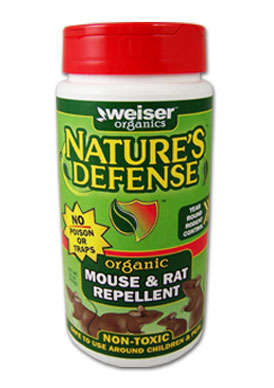
Weiser's Nature's Defense uses 7 different active ingredients all of which are Certified Organic and non-toxic. Weiser's Nature's Defense is the only critter repellent that is totally organic and safe to use inside or outside your home, around your pets and your family. It contains no rotten egg or blood. Some repellents use these active ingredients that can attract other unwanted animals such as skunks, raccoons and possums--which you don't want anywhere near your ducks and geese!
Weiser's Nature's Defense Granular Mouse and
Rat Repellent is a combination of the
strongest, most effective animal repellent
ingredients found in nature today. 100% safe and
organic to effectively get rid of mice and rats.
Organic formula is Non-Toxic and safe to use
around children and pets. Your mouse or rat
problem will be solved quickly and easily with
no mess, clean up or killing. This convenient
size is great for home and garden use.
Sonic Molechaser
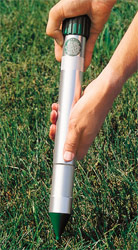
Keep your turf free of moles, voles, shrews, pocket mice, ground squirrels and other ground rodents. The Sonic Molechaser® produces an underground penetrating sonic pulse of 300 Hz at 15 second intervals, covering up to 11,250 sq. ft. While most pets won’t be affected, rodents find the noise intolerable and are forced elsewhere. The battery cylinder allows you to change the batteries without removing the unit from the soil. Constructed from a single billet of aluminum. Measures 16" long. Uses four “D” batteries (not included).
Rodent Bait / Poisons
Upon your request, we have spoken with representatives at TomCat (Bell Labratories/Motomco Ltd.) to find out more about the safety/hazards of using rodent bait around waterfowl.
Again... We are not recommending any of these products or tactics, we are simply providing some information that may or may not be useful in your situation.
Here's what they had to say:
-
Do NOT use bait INSIDE your duck or goose pens or anywhere that they travel or forage.
-
Anch0r large bait "chunx" (as opposed to small pellets) OUTSIDE or around your pen (not too close) and INSIDE bait stations.
-
Purchase a refillable bait station with a clear window, so you can quickly and easily monitor the size of the bait chunx inside. BEFORE the bait is gnawed down to a size that can be carried out of the trap, REPLACE the bait with a new block (using gloves).
-
Unless you have a huge rodent problem, use bait stations on a short term basis, until the problem is resolved and then stop. Do NOT use poisons proactively in order to prevent rodents from coming into your pens, but reactively to handle a problem and then stop usage completely once it's resolved.
Questions & Answers:
Q. Which of your products do you recommend around waterfowl?
A. Vitamin D3, Bromethalin and Anticoagulant rodent bait chunx are all safe around waterfowl, poultry and birds. However, our Vitamin D3 product: "Agrid3 Bait Chunx" has substantially less risk of secondary poisoning and is recommended and preferred around poultry. This product is often used at farms and zoos and is even effective against anticoagulant resistant rodents.
Q. Is it true that you have to rotate the types of poisons being used in order for them to be effective? Switching from Vitamin D3 chunx to Bromethalin or Anticoagulant chunx?
A. Not usually and not for smaller problems. Occasionally you'll have a rodent that doesn't like the taste or smell of a particular poison. In which case, that rodent may live to reproduce, but normally, one type of poison will handle your problem efficiently.
Q. How do Vitamin D3 bait chunx work?
A. It overwhelms their system with Vitamin D, which causes them to absorb huge quantities of calcium into their bloodstream, resulting in heart and renal failure.
Q. How do Bromethalin bait chunx work?
A. They damage the central nervous system then increase intracranial pressure, which results in paralysis, convulsions and death.
Q. How do Anticoagulant bait chunx work?
A. They prevent proper blood-clotting which results in hemorrhaging (internal bleeding).
Q. If an animal/pet eats a dead and poisoned rodent, can they receive a secondary poisoning?
A. If an animal eats a rodent that has died from eating a Vitamin D3 formula bait (like Agrid3 or Terad3) then the poison has been metabolized and will have no effect on the animal. However, if an animal eats the rodent after poisoning, but while the rodent is still alive, the animal can receive a secondary poisoning, yes. On the other hand, if an animals eats a living or dead rodent poisoned with Bromethalin or with an Anticoagulant they can receive a secondary poisoning.
Q. If a rodent eats any of these three kinds of bait (Vitamin D3, Bromethalin or Anticoagulant) and then defecates in someone's waterfowl pen, can a duck or goose receive a secondary poisoning through incidental ingestion of that fecal matter?
A. Rodents metabolize these poisons and pass very little on through their fecal matter. A duck or goose would have to eat pounds of it--a whole bowl full, in order to experience adverse effects. However, care should be taken around ducklings and goslings who are more sensitive and have a very low body weight as well as around older, immune deficient or special needs birds.
Q. What order would you list these products according to their safety--especially in regards to other animals/wildlife?
A. #1 Vitamin D3, #2 Bromethalin and #3 Anticoagulant.
Q. If I have more questions, who can I contact?
A. You can reach our Motomco corporate headquarters at PH: 608-244-2904.
Comparing All Three:
1) Vitamin D3
PROS:
-
Considered the safest around waterfowl.
-
Kills rodents in 2-4 days.
-
Less bait is required. Once rodents eats the bait, all feeding stops.
-
Low risk of secondary poisoning to other animals.
-
Kills anticoagulant resistant rodents.
CONS:
-
Vets can treat an accidental poisoning with Calcitonin, BUT... this only works if treatment is sought out immediately--before the onset of obvious symptoms (vomiting, organ failure). This usually means it can only be treated if the poisoning is actually witnessed and acted upon right away.
-
Rodents may learn to associate feeding with poisoning and learn to avoid bait.
Indications of Vitamin D3 poisoning:
Appetite loss, excessive thirst, muscle weakness, high blood calcium levels, sluggish reflexes, slow heartbeat and seizures.
2) Bromethalin
PROS:
-
Kills rodents in 1-2 days.
-
Less bait is required. Rodents stop eating after receiving a toxic dose.
CONS:
-
There is no antidote.
-
Higher risk of secondary poisoning in other animals (esp. dogs that eat dead animals). Treatment of secondary poisoning is possible (induce vomiting, activated charcoal, evacuating the bowel).
-
Rodents may learn to associate feeding with poisoning and learn to avoid bait.
Indications of Bromethalin poisoning:
Seizures, muscle tremors, impaired movement (wobbliness), extreme sensitivity to touch, paddling, excessive body heat, paralysis, loss of appetite, coma.
3) Anticoagulants
PROS:
-
Because of the delay between eating enough of this poison to become lethal, most rodents don't die for 1-2 weeks. This means that most rodents don't associate their illness with their feeding habits and therefore, don't avoid the bait.
-
Vets can treat an accidental poisoning with Vitamin K1.
CONS:
-
Kills rodents in 1-2 weeks.
-
Commonly considered painful and inhumane to the rodent.
-
Highest risk of secondary poisoning in other animals (cats that hunt and consume poisoned rodents and dogs that eat dead rodents).
-
Some rodents may become resistant.
-
More bait is required. Rodents continue to feed on the bait even after a lethal dose is ingested.
Indications of Anticoagulant poisoning:
Abdominal distention, coughing/vomiting blood, bloody nose, fever, depression, lethargy, weakness, unexpected collapse followed by a misleading recovery.
Rodent Bait Recommendation
According to the representatives at TomCat (Bell Labratories/Motomco Ltd.) and judging by our own limited research, if you opt to poison rodents, the safest (not to be confused with "safe") and most effective (not to be confused with "entirely effective") rat bait option appears to be:
Agrid3™ Rodent Bait Chunx
This is the only rodenticide registered for use in organic production, Agrid3 Rodent Bait Chunx provides the first real solution to rodent problems for a broad array of organic producers. This vitamin D3 bait kills anticoagulant-resistant rats and mice and substantially reduce the risk of secondary poisoning when compared to other baits. For use in all types of organic production facilities, including in and around poultry agricultural buildings. Chunx withstand most baiting conditions because they are mold and moisture resistant, have a high melting point and resist crumbling.
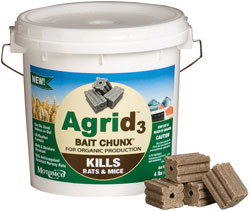
TomCat Refillable Rat Bait Station
Rodent bait chunks should ALWAYS be anchored securely inside a specially designed bait station. TomCat offers a Refillable Rat Bait Station for your Agrid3 Bait Chunx (available online through: True Value Hardware Stores). The clear window on top makes it easy to monitor bait levels, so you'll know when it's time to replace your Chunx (BEFORE it can be carried out of the station). This station is proven to be tamper-resistant to kids and dogs and meets the EPA's highest level of station security and quality.
